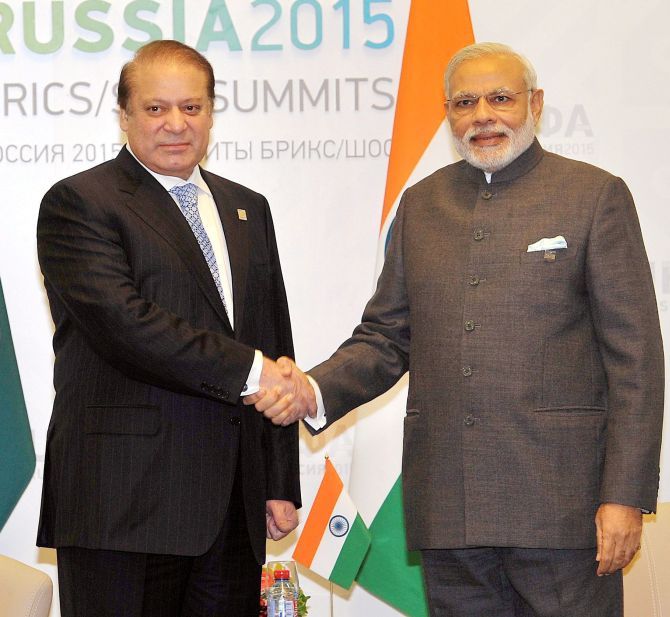 The meeting between Prime Minister Nawaz Sharif and his Indian counterpart Narendra Modi drew mixed reactions in Pakistan, with most of the political parties accusing Sharif of failing to highlight Kashmir but the media was generally positive.
The meeting between Prime Minister Nawaz Sharif and his Indian counterpart Narendra Modi drew mixed reactions in Pakistan, with most of the political parties accusing Sharif of failing to highlight Kashmir but the media was generally positive.
However, the media also was disappointed that Kashmir did not figure in the joint statement.
Opposition Pakistan People's Party welcomed the meeting between the two leaders in Ufa, Russia on Friday but said Sharif failed to highlight Pakistan's concerns clearly and precisely, the Express Tribune reported.
Senior PPP leader and former ambassador to US Sherry Rehman described the meeting as "one-sided".
"We welcome PM Modi to the SAARC summit and we also support PM Sharif's peace efforts, but breakthroughs in bilateral relationships can only be achieved when concerns from both sides are successfully communicated," she said.
"Otherwise such initiatives fall short of sustainable peace. Successful diplomacy is always about stating your case -- in this case Pakistan’s concerns look as if they have been put on a collective back burner," she added.
Earlier, PPP leader and former interior minister Rehman Malik said it was as an insult to Pakistan as he alleged that Modi was "arrogant" and behaved like the "Tsar of Russia" in the meeting.
Another opposition party, Pakistan Tehreek-e-Insaf, said that invitation to Modi was unnecessary and "beyond the requirements of diplomatic protocol".
Tehreek-e-Insaf Vice-President Shireen Mazari said Sharif failed to highlight Kashmir issue and Indian involvement in Balochistan.
Expressing disappointment over the manner in which she felt Nawaz "appeased" India, she said: "Modi raised Mumbai and Sharif agreed to 'fast track' the investigations. Not a word on Samjhauta Express was uttered by PM Sharif."
Tehreek-e-Insaf leader and former foreign minister Shah Mahmood Qureshi said that Kashmir should have been mentioned in the joint declaration.
Pakistan Muslim League-Quaid President and ex-prime minister Chaudhry Shujaat Hussain said nothing good would come out of the talks as long as Modi is India's prime minister.
Mushahid Hussain Syed, who is the Senate’s defence committee chairman, said the meeting had modest expectations and those were met.
"Though these are small steps forward, they are positive for regional peace and stability," he said.
"Modi has realised his policy of trying to bully and browbeat Pakistan or trying to isolate Pakistan has failed."
Interestingly, the Islamic parties so far largely have conspicuously failed to comment on the meeting.
The meeting has been given front page coverage by almost all newspapers, while TV channels highlighted it in the night talk-shows and in the hourly news bulletins.
Dawn newspaper quoted the PM's Adviser on National Security Sartaj Aziz as saying that the meeting was held in "very good atmosphere" as both sides believed that peace in the region was vital for progress.
The News International in its lead story quoted officials as saying that Pakistan was not happy as it expected start of full dialogue process, as India would have wanted a positive beginning when both countries were becoming members of SCO, and not to make it controversial like SAARC.
"However, while attempting to revive the bilateral dialogue process, it was done in a typical Modi approach of a 'slow and restricted engagement', instead of going back to the original composite dialogue," the paper reported.
Pro-Kashmir The Nation in its front page lead titled 'Nawaz, Modi recognise responsibility to peace' termed the meet as a "breakthrough".
It further reported that after months of stalemate and recriminations, Modi and Sharif spoke for around an hour and discussed entire gamut of issues between the two countries.
The two leaders warmly shook hands and posed for the shutterbugs before settling down for the talks.
The TV channels were critical of missing Kashmir in the final communique at the end of the talks.
Most of the TV night shows were dominated by analysts who disapproved the joint statement as it allegedly failed to highlight Kashmir and Pakistan's concerns over Balochistan unrest.











 © 2025
© 2025